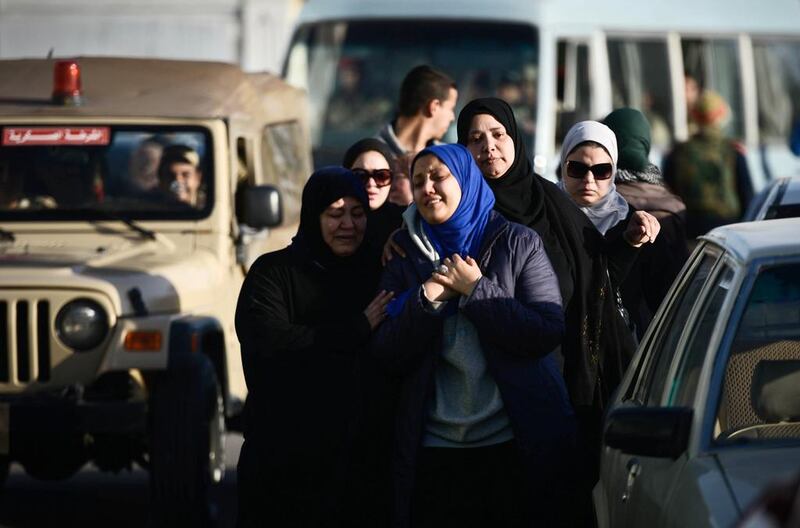CAIRO // Egypt’s army clashed with extremists in Sinai on Friday, leaving two children dead as president Abdel Fattah El Sisi flew home to deal with a wave of militant attacks that killed at least 32 people.
Health officials said a six-month-old baby was hit in the head by a bullet during the clashes and a six-year-old was killed in a rocket blast in the peninsula.
Two more people including a 12-year-old were badly wounded by gunfire.
Friday’s violence came a day after the militants targeted security forces with rockets and a car bomb in North Sinai province in simultaneous attacks claimed by an affiliate of ISIL.
Most of those killed were soldiers.
Mr El Sisi pulled out of a gathering of African leaders in Ethiopia and flew home to oversee the response to the attacks.
“After the terrorist operations in the North Sinai last night, the president decided to cut short his participation in the African Union summit after attending the opening session, and returned to Cairo to monitor the situation,” a statement from Mr El Sisi’s office said.
Security officials said the bodies of the 30 victims had been flown to Cairo.
It was the deadliest wave of attacks since October when 30 soldiers were killed and scores wounded in simultaneous assaults on security forces.
The fresh bloodshed came despite new security measures implemented in North Sinai since then.
Militants have regularly targeted security forces in the Sinai Peninsula since the Muslim Brotherhood’s Mohammed Morsi was ousted by then army chief Mr El Sisi in July 2013.
The militants say the attacks are in retaliation for a government crackdown against Mr Morsi supporters in which hundreds have been killed, thousands jailed and dozens sentenced to death.
US state department spokeswoman Jen Psaki condemned Thursday’s attacks and said Washington “remains steadfast in its support of the Egyptian government’s efforts to combat the threat of terrorism”.
Late last year Washington delivered 10 Apache helicopters to Egypt for joint counter-terrorism operations in the Sinai.
The main focus of Thursday’s attacks was El Arish, the provincial capital, where militants fired rockets at a police headquarters, a military base and a residential complex for security forces, officials said.
This was followed by a suicide car bombing, and militants also attacked a military checkpoint south of El Arish.
Separately an army officer was killed when a rocket struck a checkpoint in the town of Rafah, on the border with the Gaza Strip.
Officials said at least 62 people were wounded in the attacks.
ISIL’s Egyptian affiliate, Ansar Beit Al Maqdis, claimed the assaults in a Twitter account linked to it.
Egypt’s deadliest extremist group said it “executed extensive, simultaneous attacks in the cities of El Arish, Sheikh Zuweid and Rafah”.
In November the organisation pledged its allegiance to ISIL, which has captured large chunks of territory in Syria and Iraq.
In another incident a police officer was killed by a bomb blast in the canal city of Suez, while a suspected militant mistakenly blew himself up in Port Said while planting a device.
The October attack, also near El Arish, prompted the authorities to build a buffer zone along the Gaza border to prevent militants infiltrating from the Palestinian enclave.
The authorities have also imposed a state of emergency and night-time curfew in parts of North Sinai since October.
Egypt’s military said Thursday’s attack was the result of “successful operations” against extremists by the security forces, and “the failure of Muslim Brotherhood... in spreading chaos on the fourth anniversary of the 25 January revolution” which was marked on Sunday.
On January 25, 2011, millions of Egyptians protested against then leader Hosni Mubarak, forcing him to step down.
On Sunday as Egypt marked the anniversary, clashes between protesters and police left 20 people dead, mostly in Cairo.
Since Mr Mubarak’s removal Egypt has been rocked by political and economic turmoil.
Extremists have killed scores of police and soldiers, mostly in the Sinai, but the authorities have blamed these attacks on Mr Mubarak’s successor Mr Morsi’s Muslim Brotherhood, which denies the charges.
The army has poured troops and armour into the peninsula to fight the insurgency that has flared since Mr Morsi’s removal.
Ansar Beit Al Maqdis has claimed most of the attacks, including the deadly October assault.
* Agence France-Presse





